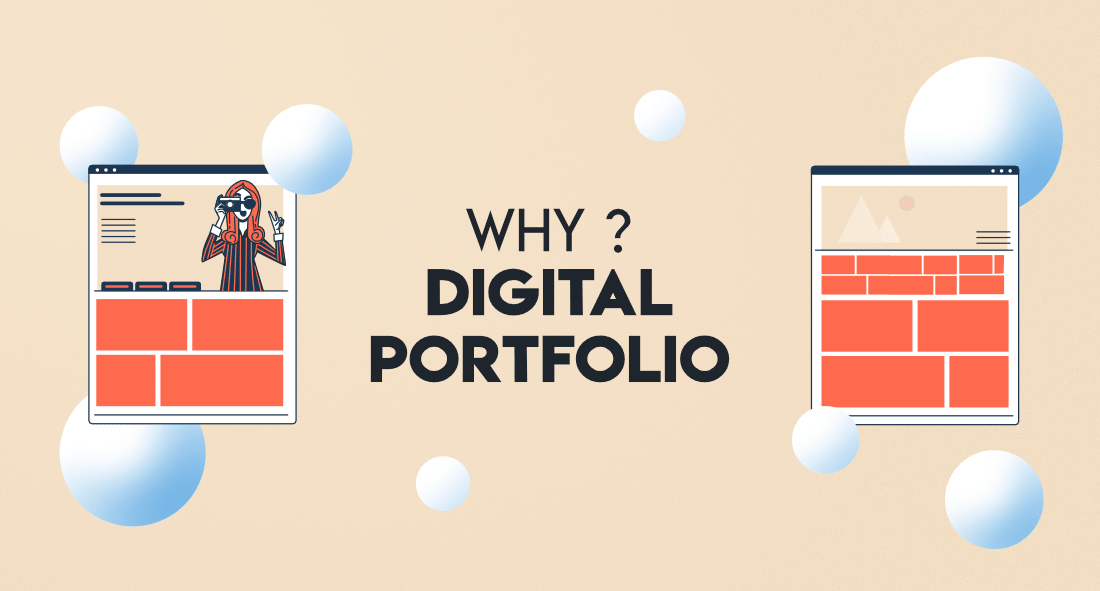
Why a Digital Project Portfolio for Fresh College Graduates is Important to get a Dream Job
As a fresh college graduate, you’re eager to start your career and land your dream job. But in a competitive job market, it can be tough to stand out from the crowd. One way to make yourself more marketable to potential employers is to create a digital project portfolio.
A digital project portfolio is a collection of your work that showcases your skills, experience, and accomplishments. It’s a great way to demonstrate to potential employers that you have the skills and knowledge they’re looking for.
What is a digital project portfolio?
A digital project portfolio is a collection of your work that is presented in a digital format. It can include websites, apps, social media campaigns, email marketing campaigns, content marketing campaigns, SEO campaigns, PPC campaigns, data analysis projects, programming projects, design projects, photography projects, and videography projects.
Why is it important for fresh college graduates to have a digital project portfolio?
A digital project portfolio is important for fresh college graduates for a few reasons.
First, it shows potential employers what you can do. It’s more than just a list of your qualifications; it’s a visual representation of your work.
Second, it makes you stand out from the competition. In a competitive job market, it’s important to make yourself stand out from other candidates. A digital project portfolio is a great way to do this. It shows potential employers that you’re proactive and that you’re passionate about your work.
Third, it gives you a chance to tell your story. Your digital project portfolio is more than just a collection of your work; it’s also a chance to tell your story. You can use your portfolio to highlight your skills, experience, and accomplishments. You can also use it to share your career goals and aspirations.
Benefits of having a digital project portfolio
Demonstrate your skills and experience to potential employers
A digital project portfolio is a great way to show potential employers your skills and experience. You can include projects that demonstrate your skills in areas such as web development, graphic design, social media marketing, and data analysis.
Stand out from the competition
A digital project portfolio can help you stand out from the competition. It shows potential employers that you’re serious about your career and that you’re taking the time to develop your skills.
Get noticed by recruiters
Recruiters often use online job boards and career websites to find candidates. By submitting your digital project portfolio to these websites, you can increase your chances of being noticed by recruiters.
Build your personal brand
A digital project portfolio is a great way to build your personal brand. You can use your portfolio to showcase your skills and experience, and to share your career goals and aspirations.
Land your dream job
By following the tips above, you can create a digital project portfolio that will help you land your dream job.
Types of digital projects to include in your portfolio
Here are a few types of digital projects that you can include in your portfolio:
- Websites
- Apps
- Social media campaigns
- Email marketing campaigns
- Content marketing campaigns
- SEO campaigns
- PPC campaigns
- Data analysis projects
- Programming projects
- Design projects
- Photography projects
- Videography projects
Tips for creating a strong digital project portfolio
Choose the right projects
When selecting projects for your portfolio, choose projects that are relevant to the types of jobs you’re interested in. Be sure to include a variety of projects that demonstrate your skills and experience.
Highlight your skills
When writing about your projects, be sure to highlight the skills and knowledge you used. Be specific and use examples to illustrate your points.
Be concise and to the point
Your portfolio should be easy to read and navigate. Avoid using jargon or technical terms that your target audience may not understand.
Get feedback
Once you’ve created a draft of your portfolio, ask friends, family, or mentors for feedback. This will help you to identify any areas that need improvement.
How to use your digital project portfolio in your job search
Share it with potential employers
When you’re applying for jobs, be sure to share your digital project portfolio with potential employers. You can attach it to your resume and cover letter, or you can include a link to your portfolio in your email signature.
Submit it to online job boards and career websites
Many online job boards and career websites allow you to submit your digital project portfolio. This is a great way to get your portfolio in front of a large number of potential employers.
Use it to start conversations with potential employers
You can also use your digital project portfolio to start conversations with potential employers. For example, you can mention your portfolio in your job interview, or you can send a follow-up email to a recruiter and include a link to your portfolio.
Useful Free Resources for your Digital Projects
The digital world is constantly evolving, and with it, the skills and knowledge required to be successful in it. If you’re a fresh college graduate looking to land your dream job in the digital field, it’s important to have a strong portfolio that showcases your skills and experience.
But how do you create a strong portfolio if you’re just starting out? And where can you find the resources you need to learn the skills you need?
Here are some useful free resources for each type of digital project that you can include in your portfolio. These resources will help you learn the skills you need to create high-quality projects that will impress potential employers.
Websites
- FreeCodeCamp offers a free course on web development that teaches you the basics of HTML, CSS, and JavaScript.
- W3Schools is a comprehensive online resource for learning web development. It offers tutorials on a wide range of topics, including HTML, CSS, JavaScript, PHP, and MySQL.
- Mozilla Developer Network (MDN) is another comprehensive online resource for learning web development. It offers documentation, tutorials, and examples on a wide range of web development topics.
Apps
- The Complete Android Developer Course on Udemy is a comprehensive course that teaches you how to develop Android apps from scratch.
- The iOS Development Bootcamp on Udemy is a comprehensive course that teaches you how to develop iOS apps from scratch.
- Flutter is a Google UI toolkit for building beautiful, native apps for mobile, web, and desktop from a single codebase.
Social media campaigns
- Hootsuite Academy offers a variety of free and paid courses on social media marketing.
- Buffer’s Blog is a great resource for learning about social media marketing trends and best practices.
- Social Media Examiner is another great resource for learning about social media marketing trends and best practices.
Email marketing campaigns
- Mailchimp Academy offers a variety of free and paid courses on email marketing.
- Constant Contact’s Blog is a great resource for learning about email marketing trends and best practices.
- AWeber’s Blog is another great resource for learning about email marketing trends and best practices.
Content marketing campaigns
- HubSpot Academy offers a variety of free and paid courses on content marketing.
- Content Marketing Institute’s Blog is a great resource for learning about content marketing trends and best practices.
- Copyblogger’s Blog is another great resource for learning about content marketing trends and best practices.
SEO campaigns
- Moz Academy offers a variety of free and paid courses on SEO.
- Search Engine Land is a great resource for learning about SEO trends and best practices.
- SEMrush Blog is another great resource for learning about SEO trends and best practices.
PPC campaigns
- Google Ads Academy offers a variety of free and paid courses on Google Ads.
- WordStream’s PPC University is a great resource for learning about PPC trends and best practices.
- PPC Hero’s Blog is another great resource for learning about PPC trends and best practices.
Data analysis projects
- Python for Data Science on Coursera is a free course that teaches you the basics of Python for data science.
- Machine Learning on Coursera is a free course that teaches you the basics of machine learning.
- Data Science: R Basics on Coursera is a free course that teaches you the basics of R for data science.
Next steps
Now that you have a better understanding of digital project portfolios and the resources available to help you create one, here are some next steps you can take:
- Start brainstorming your portfolio projects. What types of projects are you most interested in working on? What types of projects will best showcase your skills and experience?
- Choose a few resources to get you started. Visit the links in the call to action section above to find resources that are relevant to the types of projects you want to include in your portfolio.
- Start creating your projects! Don’t be afraid to start small. Even a simple project can be a great way to demonstrate your skills and abilities.
- Once you have a few projects to showcase, start building your portfolio website. There are many free and easy-to-use portfolio builders available online.
- Share your portfolio with potential employers and clients. Don’t be afraid to put yourself out there and let people know about your skills and experience.
If you are a fresh college graduate who is interested in learning more about creating digital project portfolios, or if you need help creating your own, please contact Learnpact.


